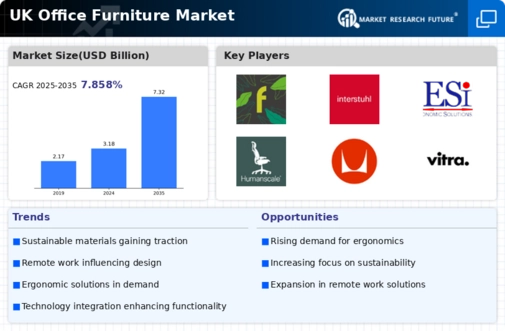Increased Focus on Employee Well-being
The office furniture market is witnessing a growing emphasis on employee well-being, which is becoming a critical driver of market dynamics. Companies in the UK are increasingly recognizing the importance of creating comfortable and supportive work environments. This trend is reflected in the rising demand for ergonomic furniture, which is expected to account for over 30% of total office furniture sales by 2025. By investing in high-quality, health-oriented office furniture, businesses aim to enhance productivity and reduce absenteeism. Consequently, the office furniture market is evolving to prioritize products that promote physical and mental well-being, thereby influencing purchasing decisions across various sectors.
Customization and Personalization Trends
The office furniture market is experiencing a surge in demand for customization and personalization options. As businesses strive to create unique work environments that reflect their brand identity, the need for tailored furniture solutions is becoming increasingly apparent. In the UK, the market for customizable office furniture is projected to grow by 18% over the next five years. This trend is driven by the desire for flexibility in design and functionality, allowing companies to adapt their spaces to meet specific needs. Consequently, manufacturers are focusing on offering modular and bespoke furniture solutions, thereby enhancing the overall appeal of the office furniture market.
Sustainability and Eco-friendly Materials
The office furniture market is increasingly shaped by the demand for sustainability and eco-friendly materials. As environmental concerns gain prominence, UK businesses are seeking furniture solutions that align with their sustainability goals. This shift is evident in the growing preference for products made from recycled or sustainably sourced materials. Market data suggests that eco-friendly office furniture sales could rise by 25% in the next few years. Manufacturers are responding by developing innovative designs that minimize environmental impact while maintaining aesthetic appeal. This trend not only reflects changing consumer preferences but also positions the office furniture market as a key player in the broader sustainability movement.
Shift Towards Remote and Hybrid Work Models
The office furniture market is significantly influenced by the ongoing shift towards remote and hybrid work models. As companies in the UK embrace flexible working arrangements, there is an increasing demand for home office furniture that meets both aesthetic and functional requirements. This trend has led to a projected increase of 20% in sales of home office furniture by 2026. Furthermore, businesses are investing in adaptable office layouts that accommodate both in-office and remote employees. This dual focus on home and office environments is reshaping the landscape of the office furniture market, prompting manufacturers to innovate and diversify their product offerings.
Technological Advancements in Office Furniture
The office furniture market is experiencing a notable transformation due to rapid technological advancements. Innovations such as smart desks and integrated charging solutions are becoming increasingly prevalent. These developments not only enhance functionality but also improve the overall user experience. In the UK, the demand for tech-enabled office furniture is projected to grow by approximately 15% over the next five years. This shift indicates a strong inclination towards modern workspaces that prioritize efficiency and connectivity. As businesses adapt to new technologies, the office furniture market is likely to see a surge in products that cater to these evolving needs, thereby driving growth in the industry.

























Leave a Comment